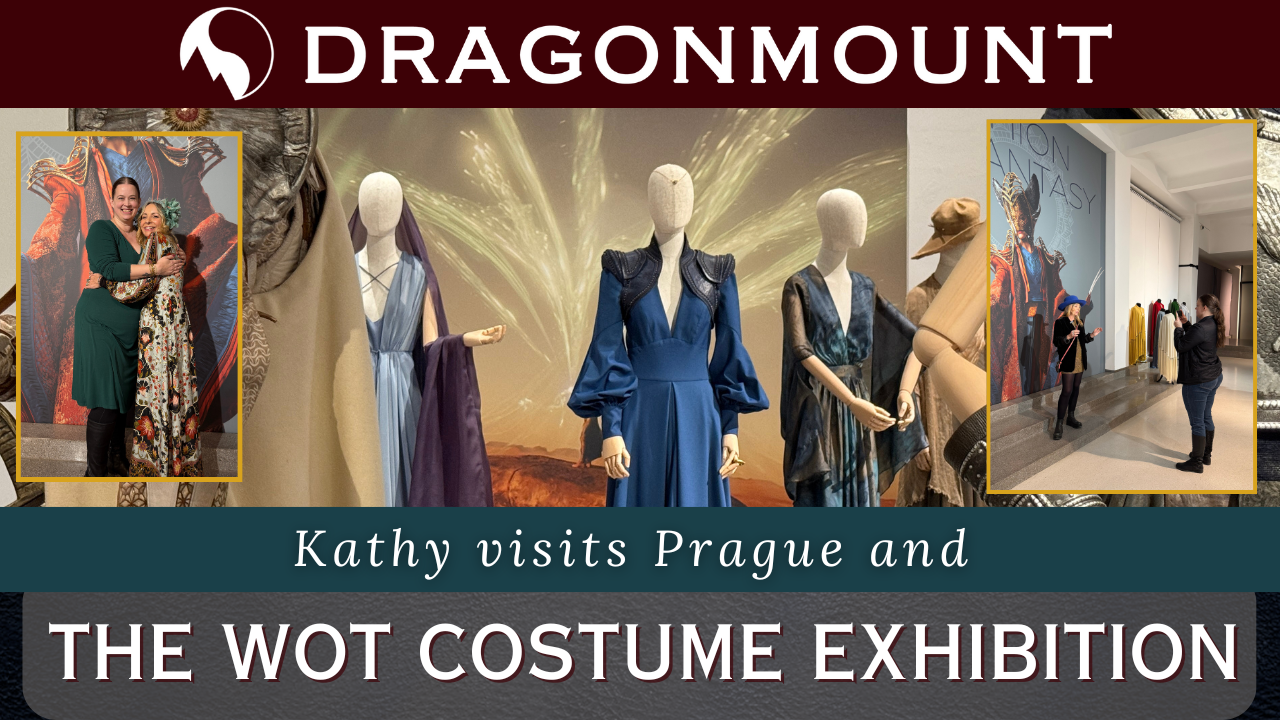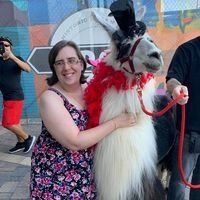News items
The Wheel of Time costume exhibition at Prague's Galerie Manes showcases over 80 breathtaking costumes, offering an unprecedented look at the intricate craftsmanship behind the show.
Read More...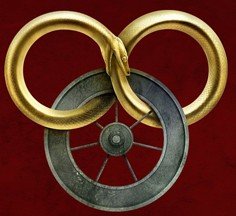
According to a Twitter poll from Amazon Prime Video, The Wheel of Time television adaptation is the most anticipated series. (IMAGE TEXT: We have a lot of shows that started as books, but which UPCOMING book adaptation series are you most excited for? #WorldBookDay; 20% Good Omens, 26% The Expanse, 18% The Lord of the Rings, 36% The Wheel of Time) While fans of the show rejoice, and agree, it's pretty amazing that Wheel of Time could top some of the other anticipated series. Bleeding Cool states how they "were NOT expecting Wheel of Time to top that list." Understandable, considering The Lord of the Rings has been hyped up. As has Good Omens, which already has trailers, cast, and an official release date (May 31, 2019--for those who were wondering). With Wheel of Time barely in production, this is a great indicator of how much we've wanted a show to represent our beloved series! You can catch the latest updates from Rafe Judkins' Twitter feed, which he updates pretty regularly with interesting hints and tidbits. Also, stay tuned to Dragonmount for more news.
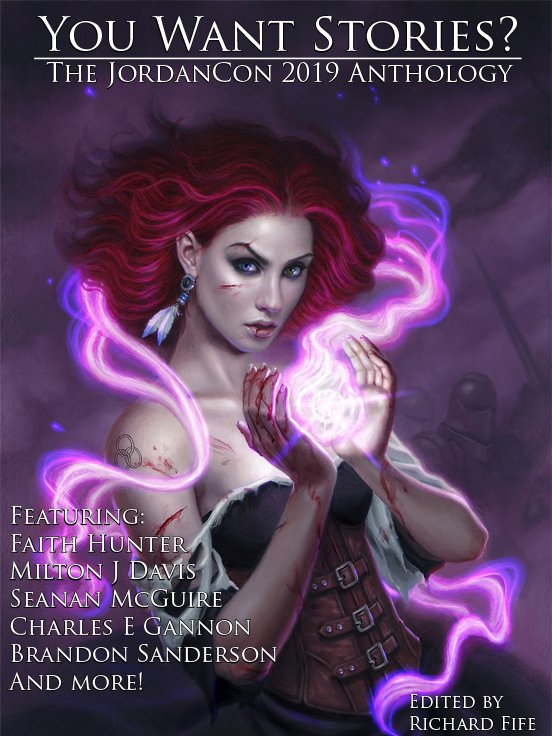
For our next entry in the first ever JordanCon Anthology—So You Want Stories?—I got to talk to Alexandra Hill about her submission "The Bakery: Prelude to a Fairy Tale." First, can you tell us about your writing? Is this your first published work? I read really broadly, and I think that translates into what I write; I’ve either finished or am in the process of stories in a number of genres, including sci-fi, mystery, fantasy, memoir, and so-called “literary fiction.” Fantasy feels like home, though, especially in atemporal or modern settings. I love how the genre lets me ask “what if…?” not just of my characters, but of the world in which they live. I’ve published academic writing under my real name – I’m a computational biologist by training, and have a few papers out under my real name – but “The Bakery” is my first work of published fiction. Where does your story fall on the speculative fiction scale? I think the title gives it away! “The Bakery: Prelude to a Fairy Tale” is fantasy, and sets up the world before “Once upon a time.” What excited you the most with writing this story? A million years ago, my Grade 12 English class was able to pick whatever topic they wanted for their final project. My subject: “Freudian Psychoanalysis and the Evolution of the Modern Day Villain.” I had a blast. I interpreted how Freud would have interpreted the backstories of villains in three 90s Batman Movies and three novels (Perfume, Harry Potter, and Hannibal Rising). Writing this story felt as fun as that project. I loved creating my own spin on the backstory of a female villain. I think the world sees a lot of stories of men behaving badly, and having some kind of origin story for their evil and/or redemption arcs, but historically, women’s stories haven’t been explored that way. I don’t think that Elle’s life justifies any of her more “established” story, but I hope I’ve managed to create more depth to the character! Are there any themes you want readers to get a sense of? I’ve always been fascinated in peoples’ opinions of themselves. I think most people think that they’re fairly good people, but situations like Elle’s, where you’re stuck between impossible options through no fault of your own, mean that most people’s moral sense gets thrown out the window. I hope that readers ask themselves what they’d do in her place – and then really ask themselves what they’d do if they were her. Is there a specific inspirational source you used for this story? Yes. …What, you think I’m going to give away the ending? What else would you like to say to your readers? I hope you enjoy this story! If you see me at JordanCon, be sure to stop and tell me who your favorite fictional villains are. Thanks, Alexandra, for joining us at Dragonmount! And don't forget today is the last day to preorder So You Want Stories? from JordanCon's website. The convention will have a few copies on hand, but don't risk it!
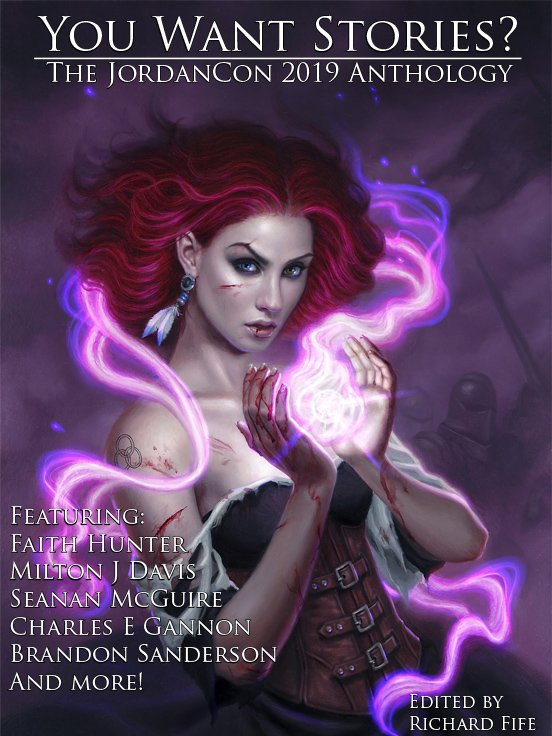
With JordanCon fast approaching, I want to take this opportunity to give a preview of what the 2019 anthology, So You Want Stories, will entail. First some background information. This is the first year JordanCon put out a call to past and present members, seeking submissions of speculative fiction short stories to feature in an anthology—with proceeds going to JordanCon Charities, which get donated to the Mayo Clinic. Twenty of the submitted stories were chosen, and some are written by authors we know and love, including Brandon Sanderson and Jason Denzel! Some, however, are relatively unknown. Leading up to JordanCon, I will feature one of the lesser known authors each week. This week’s author is Andy Floyd, with his contribution “Doorbuster.” First, can you tell us about your writing? Is this your first published work? It is my first published work! But it’s definitely not the first thing I’ve written. The very first thing I ever wrote was Deep Space Nine fanfiction. I was in high school and it was just before the internet became a huge thing, so I had no idea what fanfiction was. I just thought I could write a Star Trek novel and submit it to someone to be published! After that, I mostly dabbled in song parodies and web comics until I graduated college. Then, a friend of mine (who also happens to be the one who introduced me to DragonCon and cons in general) told me I should join him for NaNoWriMo. I felt overwhelmed, but I had a blast and actually made my goal word count! All I wanted to do after that was write. Though, thankfully everything from that era is lost to a hard drive crash as it was all very, very terrible. (Seriously! I fridged not one, but TWO characters in my first novel. It’s all better off lost to the ether.) But, I kept it up until about ten years ago when for a number of reasons I just stopped. I continued having ideas, but with a very few and minor exceptions, I didn’t write them down. Then, a couple of years ago I got an idea for a novel about magic tech support. So, with motivation I hadn’t felt in nearly a decade, I sped to around nine thousand words... and then I got stuck. Fast forward to JordanCon 2018. It was my wife’s and my first JordanCon and we were blown away! Not only that, but the whole thing inspired me to write again! I picked back up that novel and tried to get back into it. But, no matter what I did, I just couldn’t connect with my characters. Then, the anthology contest was announced. I decided I had to submit something, anything to it. After a lot of thought I finally decided on a prequel to my novel. I thought it’d make a great short story, but could maybe also help me connect with my characters. It worked like a charm! As soon as I finished it, I launched into the novel and completed it as well. So, not only is “Doorbuster” my first published work, but it’s also the first story I finished after a very long writing hiatus which makes it very special to me. I’m extremely excited to see it in print! Where does your story fall on the speculative fiction scale? I mean, it’s probably just Contemporary Fantasy, but I like to say it’s “Suburban Fantasy.” This started off as a joke to me, because it has a lot of Urban Fantasy elements, but the whole story takes place in a big box store at a shopping center during broad daylight. But, I really liked the idea, so I googled it. I was sure someone else had used it before, but the only reference I could find with my very quick searching was, “Untitled Pixar Suburban Fantasy Movie.” I figure, if it’s good enough for Pixar, it’s good enough for me. So I’ve stuck with it and that’s what I use in my queries. What excited you the most with writing this story? That it got me back into the writing habit! But, really -- and actually I should clarify first -- even though my JordanCon Anthology short story “Doorbuster” stands on its own, it’s hard for me to separate it from my novel. I wrote them at the same time and one leads right into the other. So, some of the things that really excited me about writing it don’t really pay off until the novel. I’m sorry if that’s cheating, but it’s true. And those “things” were getting to explore how I felt about my day job and where I wanted to be five, ten years down the road. “Doorbuster” is about how the main character Taryn first gets into magic support, which mirrors my own story with tech support. Then, the novel jumps to five years later and we really get into her (and my) thoughts and feelings on being stuck in a job while also self sabotaging herself into not moving on to anything else. Getting all of that out onto the page really helped me not only do what I love by writing more, but it also helped me start the process of finding a different and better day job myself. Are there any themes you want readers to get a sense of? I’m not their English teacher! They have to do their own homework! Kidding, but not really? It’s not that there aren’t themes. There are. I mean, that keeps things interesting, right? But I enjoy genre fiction for its escapism, so that’s really the main thing I want people to get from my writing. If they get anything else out of it, that’s a huge bonus, but not necessarily the first thing I’m thinking of when crafting a story. Is there a specific inspirational source you used for this story? You mean apart from JordanCon? Well, my day job is tech support and I keep a Google Doc open the entire time I’m working. I’m constantly adding either transcripts or cliffs notes of calls I get. Every single “magic support call” in “Doorbuster” and my unpublished novel comes from that file. Apart from that, the characters are mostly based on friends. I tend to give them the positive traits I love from my friends and then add my own flaws and insecurities on top. What else would you like to say to your readers? First off, I really hope that if you can get a copy of the JordanCon Anthology You Want Stories? that you enjoy Doorbuster. Though, if you can’t get your hands on it, don’t worry. Once the publishing rights revert to me, I’ll put it up on my website. Until then, you can follow me on the tweeter (@pandrewfloyd) and check my site for other content. It’s still under construction, but I’ve got a few things up like the first chapter of Factory Defect (the aforementioned novel sequel to “Doorbuster”) and a deleted scene or two. Second, keep an eye out for me. I’ve gotten a taste of what it’s like to see my words in a printed book, and I’m not going to stop until it happens again and again. Thanks, Andy, for joining us at Dragonmount today! If you would like to get a copy of So You Want Stories? preorders are available until April 8th. Check out JordanCon’s website for more information.
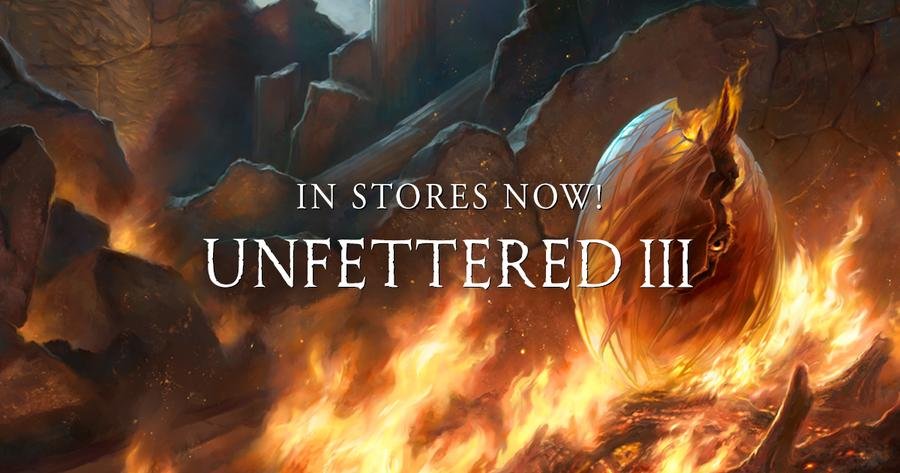
Unfettered III, the fantasy anthology from Grim Oak Press, is now available for purchase. The book features stories from some of today's top names in fantasy literature including Terry Brooks, Lev Grossman, Delilah S. Dawson, Seanan McGuire, Naomi Novik, and Tad Williams. It also, very notably, includes a new "deleted novella" from Robert Jordan & Brandon Sanderson, as well as a short story from Dragonmount founder Jason Denzel. A Fire Within the Ways is the name of the deleted sequence of chapters that was originally written for A Memory of Light. It's a non-canon story that features Perrin within the Ways. Here's a portion of what Brandon had to say about it: Brandon's blog post about the story. You can read its opening portion for free on Tor.com, and join a discussion on our forums. In addition to the Wheel of Time story, Unfettered III includes a short story from Dragonmount founder Jason Denzel entitled, "The Stone Golem of Qual'Jom." From Jason: You can read more about that story on Jason's website. Unfettered III is currently available in hardcover and ebook. An audiobook edition is coming soon. The publisher reported that they've had some issues with Amazon, and are working to get the book available there. But in the meantime you can get the ebook edition from other vendors such Barnes & Noble and Kobo.

Our friends at Ta'veren Tees celebrated their eighth birthday earlier this week! That's an amazing eight years of fantastic officially licensed Wheel of Time goodies. They also have some new merchandise to show off! The nameday sale goes on till March 20th, so act fast!
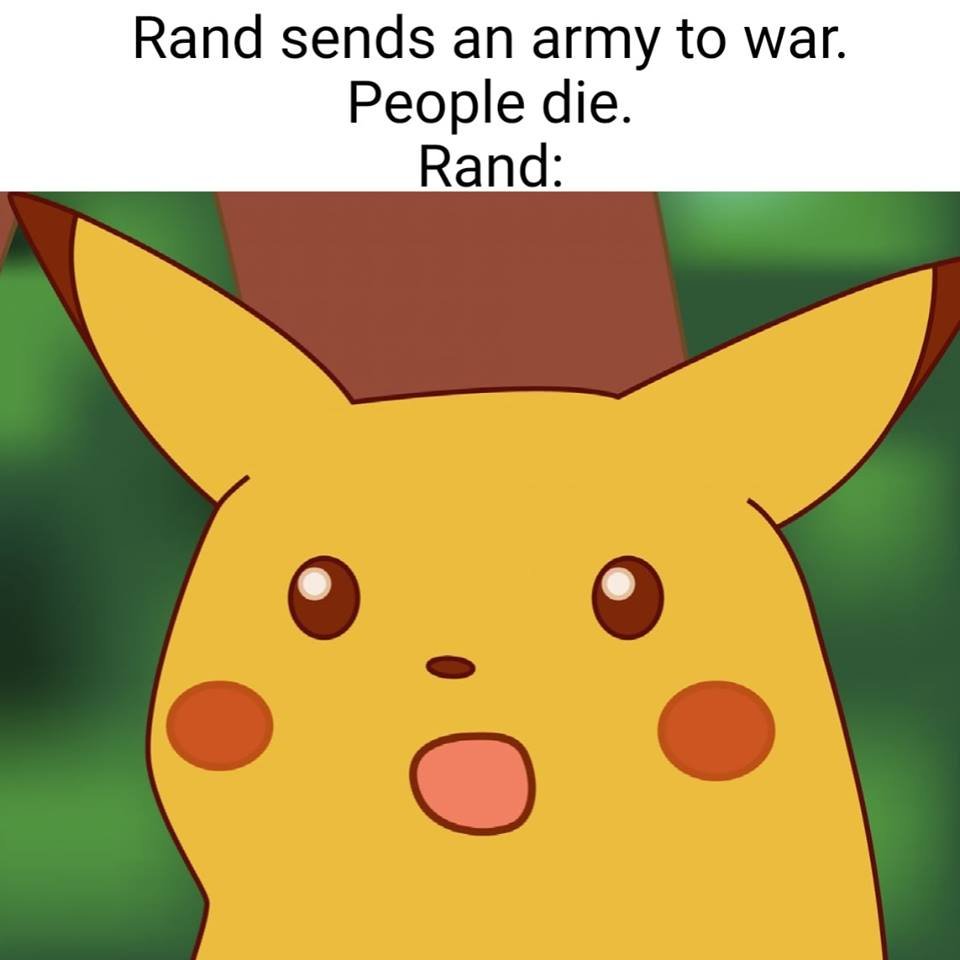
Welcome back to another exciting edition of "Meme Monday." Today we'll look at some of the woes that plague the Dragon Reborn in his relationships. We covered one of the major negative impacts on Rand's girl troubles a few weeks ago. But let's add another log to that fire. And still on the subject of his love interests, Rand has an awful lot to deal with to keep his sigfigs happy. And let's not overlook Rand's not-romantic relationships. He is a ruler, you know. A king. A chief. He makes a lot of important decisions. The memes this week come from Kevin O'Bryan of DMEN Designs. If you have memes you want to share, email me at frontpage@dragonmount.com.
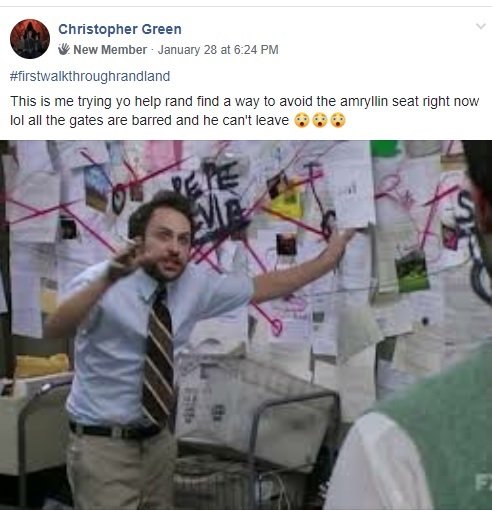
I wanted to take a break from our normal memes to talk about a new reader who’s taking the Wheel of Time fandom by storm. Christopher Green started reading The Wheel of Time in January. His father is a huge fan, and Christopher started reading after his father suggested it to him. Around the middle of his read of The Eye of the World, Christopher began to post real time updates about his progress and his reactions on the Facebook public group Screw You All, I Love Wheel of Time. The journey has been amazing so far, and many fans are reliving the joys of a first read through Randland. Some of Christopher’s first posts into The Great Hunt: (Alright..... how in the WORLD..... am I gonna sit down all relaxed to read this book before my wife made super sweet awesome dinner of chili.... to find in the first two chapters before dinner...... The dark one is alive and apparently regaining his physical form with like 100 darkfriends AND this [amyrlin] person the queen of the aes sedai shows up the end of chapter there isn't any messing around I hope that [amyrlin] lady helps him) (This is me trying [to] help rand find a way to avoid the [amyrlin] seat right now lol all the gates are barred and he can’t leave) (Ladies and gentleman... WE HAVE A BLADEMASTER!!! GO RAND GO) (MAN EGWENE IS GOING NUTS KILLING SEANCHAN PEOPLE WITH LIGHTNING!!!!) (LORD INGTAR NOOOOOOOOO WHYYY!!!!!!) Christopher started using the hashtag #firstwalkthroughrandland on all his posts once his followers begged him to. And some have even expressed their anxiety that Christopher hadn’t posted yet that day. And naturally, everyone is waiting with anticipation for Christopher to reach certain scenes. (I can't wait till Christopher gets to the end of Fires of Heaven, and asks the biggest burning question of the series that we all fought and theorized over for years. Who ___ed ___an?) And this past weekend, he finally hit the turning point for Mat. Christopher didn’t care for Mat at first: (I woke up and was thinking.... that I have no idea how mat is important to the story other than comic relief and mischief? He literally got stabbed by a knife and that's it so [far]. I mean rand can channel and is the dragon, Perrin talks to wolf's and the women are aes sedai.) But the scene where Mat challenges Galad and Gawyn to a spar changed his mind. (WHAT THE HELL HE WON AND WHOOPED EM.... I LIKE NEW MAT) Almost everyone has been kind and considerate to Christopher, and they are going out of their way to avoid spoiling major parts later in the books. Christopher is happy that everyone is being nice and getting such joy out of his shared experience. You can read with Christopher on his journey at the Screw You All, I Love Wheel of Time Facebook group!
I've been meaning to highlight this craft for awhile. For last year's JordanCon, I was very excited to finish my sul'dam dress. It turned out beautiful, and I adore the silver lightning bolts. But a sul'dam without a damane isn't complete. So, with long-time Dragonmount member Hallia as a willing participant, I got to work on crafting a damane dress. I started with four yards of a gray poplin folded in half. This gave me 72 inches in height and 60 inches in length. That's a great amount of material and the price for poplin is so reasonable! With simplicity in mind, I wanted to do as little cutting and sewing as possible. I cut the arms and sides with a single cut, then cut the neckline. I added satin binding to the bottom hem and the sleeves. The neckline gave me some trouble. I started an elastic binding, but it bunched too weird, so I switched it for a ruffle. And here we are at JordanCon! Hallia was such a good damane! And this was such a simple project.
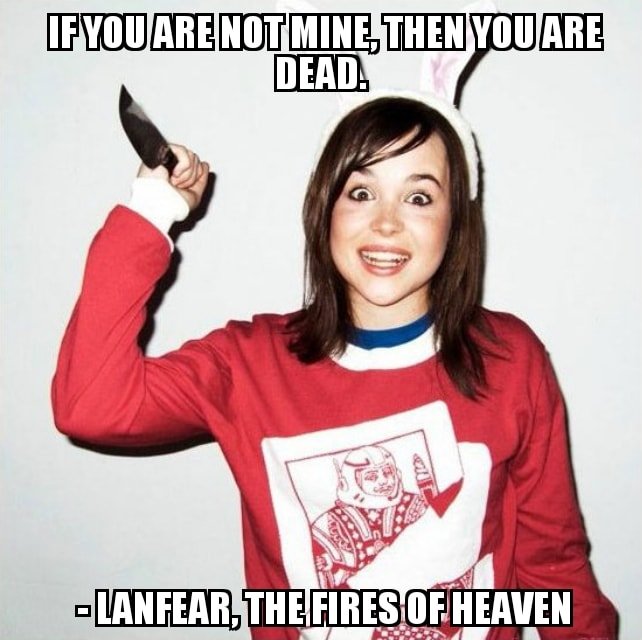
Welcome back to another Meme Monday. This week's victim is Lanfear, our favorite crazy ex-girlfriend. She first appears as Selene in The Great Hunt, and seems a sweet, sympathetic noblewoman on the run. However, things escalate quickly. And if that weren’t bad enough…. Odd to think that not much needs to be added to Lanfear’s actual dialogue. At least she serves as a good example of how not to act. The memes this week come from Kevin O'Bryan of DMEN Designs. If you have memes you want to share, email me at frontpage@dragonmount.com.
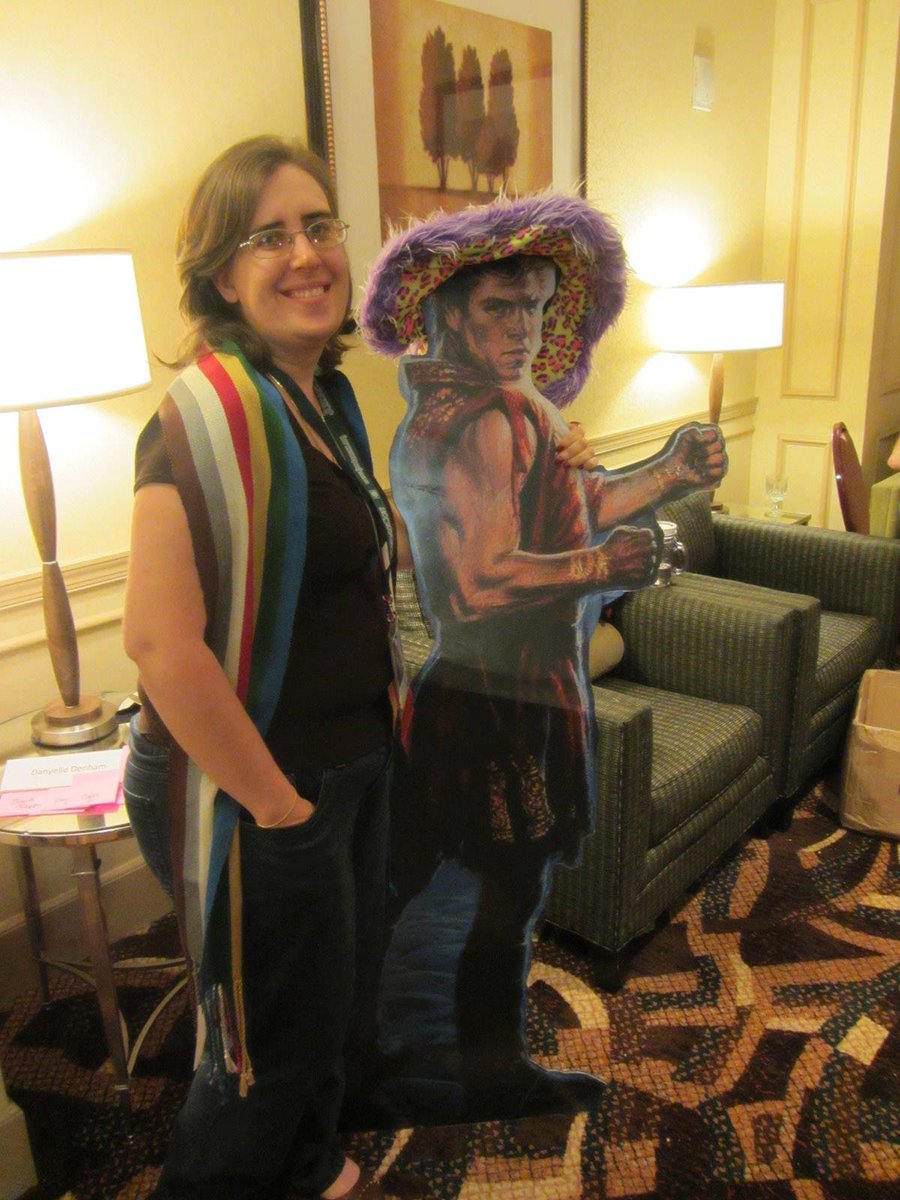
This past week, Dragonmount's second-in-command Jennifer Liang participated in an Ask Me Anything discussion for JordanCon! The questions asked range from favorite con memory: Jenn: When I got the Chodan Kal at opening Ceremonies last year. I was so shocked and touched that y’all did that for us. To "what's your favorite thing to do at JordanCon" (asked by Jimmy, her husband): Jenn: Bother you. She also talked about this year's JordanCon theme: Jenn: This year is “Shai’Con”. We decided to embrace our darker natures this year. So expect an evil twist on the usual things like opening ceremonies and the dance. And the growing trend of wearing tiaras: Jenn: At #JordanCon? In 2013 I was elected Pres of the Southern Fandom Confederation. Jimmy did not believe I’d win & promised to buy me a tiara if I did. I proved him wrong and now I have five. To learn more about Jenn and other JordanCon shenanigans, you can read the whole thread here.
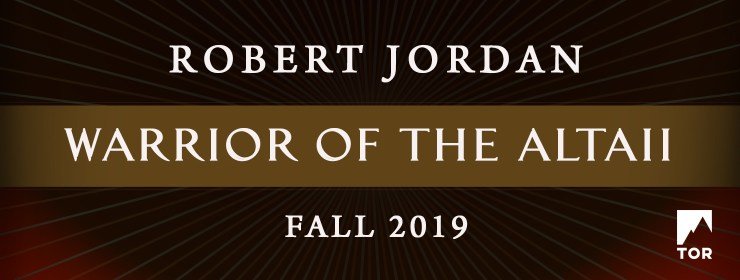
Tor Books has announced it plans to release Warrior of the Altaii, a previously-unpublished fantasy novel by Robert Jordan. The book is currently scheduled for release on October 8, 2019. Publication History Warrior of the Altaii was written before Robert Jordan began The Eye of the World (which was published in 1990). After finishing the manuscript, he received an offer of publication from Donald Wolheim at DAW Books. Jordan responded to the publisher that he was happy to receive such an offer, but wondered if some changes to the contract could be made. The publisher replied by cancelling the offer, saying that unknown authors shouldn't make such demands. Here's Robert Jordan talking about it: Jordan sold the book again in 1979 to Jim Baen, who worked for Tom Doherty at the time at ACE books. The project never got off the ground, in part because Baen was focused on science-fiction at the time, and because Tom Doherty left to found Tor Books. The rights to Warrior of the Altaii ultimately reverted back to Jordan, who decided to rest the project. What's it About? The book's official plot description: Not much else is known about the plot yet, but Wheel of Time fans can likely expect a "proto-WoT" novel filled with thematic foreshadowing that resonates with Jordan's later books. Warrior of the Altaii is expected to be a more modest-sized novel, at least in comparison to Jordan's later books. Why publish it now? Robert Jordan is on record several times saying that he didn't expect to ever publish this novel. It's clear now that Jordan's comment about having the manuscript destroyed was made in jest. Fans should remember that he made similar comments about how he would have his hard drive erased if he ever died before finishing The Wheel of Time series, and that he could never imagine another author writing in his universe, which he destained at the time as "sharecropping." Harriet McDougal, Robert Jordan's wife and the editor of The Wheel of Time series, had this to say: Although Robert Jordan has been gone for well over a decade, his legacy, and his stories live on. With this new novel, which was both his first, and his last, he is once again showing us that time, indeed, has no beginnings or endings. Warrior of the Altaii is now available for pre-order. Amazon Barnes & Noble Macmillan info page
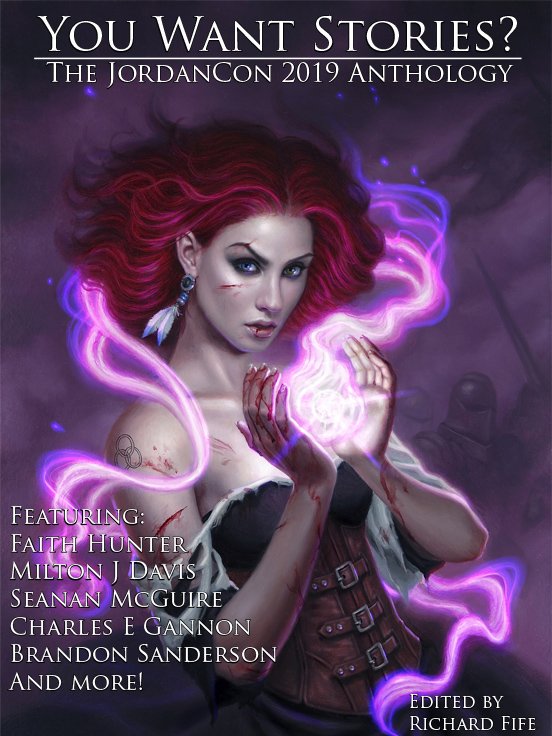
This year, JordanCon is trying something new. They put out a call to all JordanCon members, past and present, and asked for donated stories to compile into an anthology. Twenty were selected to be featured in 2019's edition, entitled You Want Stories? The list of authors is a great one, featuring Brandon Sanderson, our own Jason Denzel, as well as well-known authors such as Seanan McGuire, and Charles E Gannon. The others contributors are: Terry Beyer, Foster Bridget Cassidy, David B. Coe, Blue Cole, Gerald L. Coleman, Milton J Davis, P. Andrew Floyd, John G. Hartness, Alexandra Hill, Robert A. Hilliard, Jr, Faith Hunter, David Alan Jones, Tim Lewis, Jana Oliver, Morgan Smith, and Sarah J. Sover. I'm very happy to say that my offering was accepted! (Written under my pen name Foster Bridget Cassidy.) The beautiful cover art is by Dan dos Santos, this year's JordanCon Artist Guest of Honor. The anthology is available for pre-order now through April 8th, 2019. The Con will have a limited supply to sell to those who have not pre-ordered, but there's no guarantee you will receive a copy. The anthology can ONLY be picked up at JordanCon 11 (April 26th-28th, 2019). The book WILL NOT be shipped anywhere. That said, it is possible to have a friend pick up a copy for you. Check out the details on JordanCon's website. The net proceeds of the anthology will go to the Mayo Clinic. Pre-order now to support some indie (and not-so-indie) authors and the Mayo Clinic!



